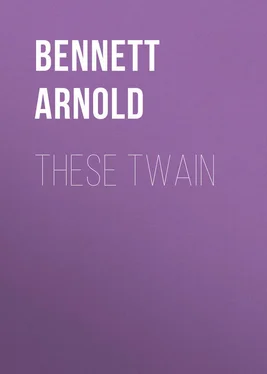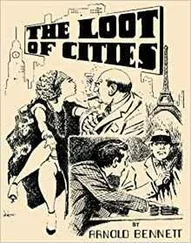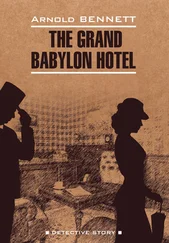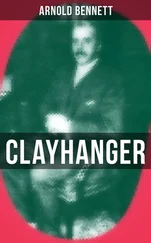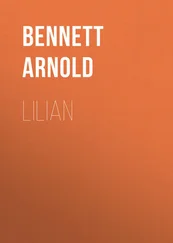Arnold Bennett - These Twain
Здесь есть возможность читать онлайн «Arnold Bennett - These Twain» — ознакомительный отрывок электронной книги совершенно бесплатно, а после прочтения отрывка купить полную версию. В некоторых случаях можно слушать аудио, скачать через торрент в формате fb2 и присутствует краткое содержание. Жанр: foreign_prose, foreign_antique, foreign_language, на английском языке. Описание произведения, (предисловие) а так же отзывы посетителей доступны на портале библиотеки ЛибКат.
- Название:These Twain
- Автор:
- Жанр:
- Год:неизвестен
- ISBN:нет данных
- Рейтинг книги:5 / 5. Голосов: 1
-
Избранное:Добавить в избранное
- Отзывы:
-
Ваша оценка:
- 100
- 1
- 2
- 3
- 4
- 5
These Twain: краткое содержание, описание и аннотация
Предлагаем к чтению аннотацию, описание, краткое содержание или предисловие (зависит от того, что написал сам автор книги «These Twain»). Если вы не нашли необходимую информацию о книге — напишите в комментариях, мы постараемся отыскать её.
These Twain — читать онлайн ознакомительный отрывок
Ниже представлен текст книги, разбитый по страницам. Система сохранения места последней прочитанной страницы, позволяет с удобством читать онлайн бесплатно книгу «These Twain», без необходимости каждый раз заново искать на чём Вы остановились. Поставьте закладку, и сможете в любой момент перейти на страницу, на которой закончили чтение.
Интервал:
Закладка:
Edwin was leading him along the side of the lawn furthest away from Trafalgar Road. Certainly the property had the air of being a very nice place. The garden with its screen of high rustling trees seemed spacious and mysterious in the gloom, and the lighted windows of the house produced an effect of much richness-especially the half-open window of the drawing-room. Fearns and Cheswardine were standing in front of it chatting (doubtless of affairs) with that important adult air which Edwin himself could never successfully imitate. Behind them were bright women, and the brilliant chandelier. The piano faintly sounded. Edwin was proud of his very nice place. "How strange!" he thought. "This is all mine! These are my guests! And my wife is mine!"
"Well, you see," he answered Ingpen's criticism with false humility. "I've no choice. I've got to be central."
Ingpen answered pleasantly.
"I take your word for it; but I don't see."
The bicycle was carefully bestowed by its groping owner in a small rustic arbour which, situated almost under the wall that divided the Clayhanger property from the first cottage in Hulton Street, was hidden from the house by a clump of bushes.
In the dark privacy of this shelter Tertius Ingpen said in a reflective tone:
"I understand that you haven't been married long, and that this is a sort of function to inform the world officially that you're no longer what you were?"
"It's something like that?" Edwin admitted with a laugh.
He liked the quiet intimacy of Ingpen's voice, whose delicate inflections indicated highly cultivated sensibilities. And he thought: "I believe I shall be friends with this chap." And was glad, and faith in Ingpen was planted in his heart.
"Well," Ingpen continued, "I wish you happiness. It may seem a strange thing to say to a man in your position, but my opinion is that the proper place for women is-behind the veil. Only my personal opinion, of course! But I'm entitled to hold it, and therefore to express it." Whatever his matter, his manner was faultless.
"Yes?" Edwin murmured awkwardly. What on earth did Ingpen expect by way of reply to such a proposition? Surely Ingpen should have known that he was putting his host in a disagreeable difficulty. His new-born faith in Ingpen felt the harsh wind of experience and shivered. Nevertheless, there was a part of Edwin that responded to Ingpen's attitude. "Behind the veil." Yes, something could be said for the proposition.
They left the arbour in silence. They had not gone more than a few steps when a boy's shrill voice made itself heard over the wall of the cottage yard.
"Oh Lord, thou 'ast said 'If two on ye sh'll agray on earth as touching onything that they sh'll ask it sh'll be done for them of my Father which is in 'eaven. For where two or three are gathered together i' my name theer am I in th' midst of 'em. Oh Lord, George Edwin Clay'anger wants a two-bladed penknife. We all three on us want ye to send George Edwin Clay'anger a two-bladed penknife."
The words fell with impressive effect on the men in the garden.
"What the-" Edwin exclaimed.
"Hsh!" Ingpen stopped him in an excited whisper. "Don't disturb them for anything in the world!"
Silence followed.
Edwin crept away like a scout towards a swing which he had arranged for his friend George before he became the husband of George's mother. He climbed into it and over the wall could just see three boys' heads in the yard illuminated by a lamp in the back-window of the cottage. Tertius Ingpen joined him, but immediately climbed higher on to the horizontal beam of the swing.
"Who are they?" Ingpen asked, restraining his joy in the adventure.
"The one on the right's my stepson. The other big one is my sister Clara's child, Bert. I expect the little one's old Clowes', the gravedigger's kid. They say he's a regular little parson-probably to make up for his parents. I expect they're out somewhere having a jollification."
"Well," Ingpen breathed. "I wouldn't have missed this for a good deal." He gave a deep, almost soundless giggle.
Edwin was startled-as much as anything by the extraordinary deceitfulness of George. Who could possibly have guessed from the boy's demeanour when his Aunt Clara mentioned Bert to him, that he had made an outrageous rendezvous with Bert that very night? Certainly he had blushed, but then he often blushed. Of course, the Benbows would assert that George had seduced the guileless Bert. Fancy them hunting the town for Bert at that instant! As regards Peter Clowes, George, though not positively forbidden to do so, had been warned against associating with him-chiefly because of the bad influence which Peter's accent would have on George's accent. His mother had said that she could not understand how George could wish to be friendly with a rough little boy like Peter. Edwin, however, inexperienced as he was, had already comprehended that children, like Eastern women, have no natural class bias; and he could not persuade himself to be the first to inculcate into George ideas which could only be called snobbish. He was a democrat. Nevertheless he did not like George to play with Peter Clowes.
The small Peter, with uplifted face and clasped hands, repeated urgently, passionately:
"O God! We all three on us want ye to send George Edwin Clay'anger a two-bladed penknife. Now lads, kneel, and all three on us together!"
He stood between the taller and better-dressed boys unashamed, fervent, a born religionist. He was not even praying for himself. He was praying out of his profound impersonal interest in the efficacy of prayer.
The three boys, kneeling, and so disappearing from sight behind the wall, repeated together:
"O God! Please send George Edwin Clayhanger a two-bladed penknife."
Then George and Bert stood up again, shuffling about. Peter Clowes did not reappear.
"I can't help it," whispered Ingpen in a strange, moved voice, "I've got to be God. Here goes! And it's practically new, too!"
Edwin in the darkness could see him feeling in his waistcoat pocket, and then raise his arm, and, taking careful aim, throw in the direction of the dimly lighted yard.
"Oh!" came the cry of George, in sudden pain.
The descending penknife had hit him in the face.
There was a scramble on the pavement of the yard, and some muttered talk. The group went to the back window where the lamp was and examined the heavenly penknife. They were more frightened than delighted by the miracle. The unseen watchers in the swing were also rather frightened, as though they had interfered irremediably in a solemn and delicate crisis beyond their competence. In a curious way they were ashamed.
"Yes, and what about me?" said the voice of fat Bert Benbow, sulkily. "This is all very well. But what about me? Ye tried without me and ye couldn't do anything. Now I've come and ye've done it. What am I going to get? Ye've got to give me something instead of a half-share in that penknife, George."
George said:
"Let's pray for something for you now. What d'you want?"
"I want a bicycle. Ye know what I want."
"Oh, no, you don't, Bert Benbow!" said George. "You've got to want something safer than a bike. Suppose it comes tumbling down like the penknife did! We shall be dam well killed."
Tertius Ingpen could not suppress a snorting giggle.
"I want a bike," Bert insisted. "And I don't want nothin' else."
The two bigger boys moved vaguely away from the window, and the little religionist followed them in silence, ready to supplicate for whatever they should decide.
"All right," George agreed. "We'll pray for a bicycle. But we'd better all stand as close as we can to the wall, under the spouting, in case."
The ceremonial was recommenced.
"No," Ingpen murmured. "I'm not being God this time. It won't run to it."
Читать дальшеИнтервал:
Закладка:
Похожие книги на «These Twain»
Представляем Вашему вниманию похожие книги на «These Twain» списком для выбора. Мы отобрали схожую по названию и смыслу литературу в надежде предоставить читателям больше вариантов отыскать новые, интересные, ещё непрочитанные произведения.
Обсуждение, отзывы о книге «These Twain» и просто собственные мнения читателей. Оставьте ваши комментарии, напишите, что Вы думаете о произведении, его смысле или главных героях. Укажите что конкретно понравилось, а что нет, и почему Вы так считаете.
